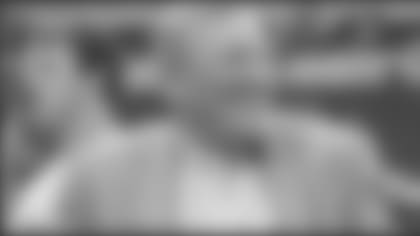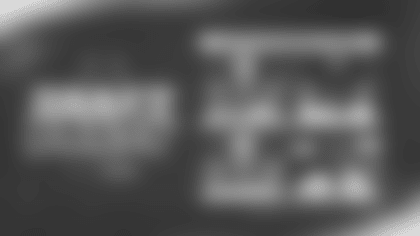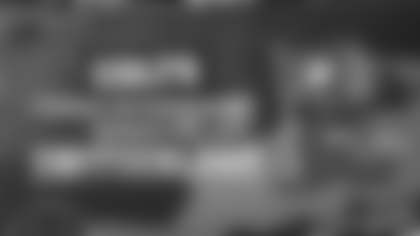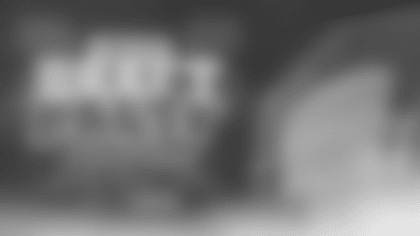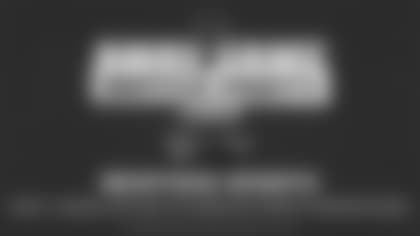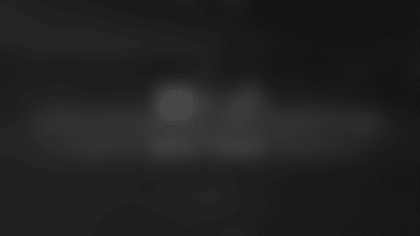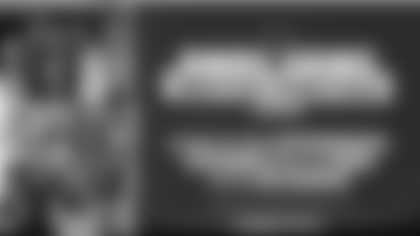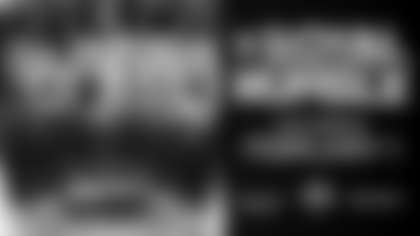Q: A 31-17 loss to the New Orleans Saints in Super Bowl XLIV
Sunday ended the Colts' season. Not the end you want, but it
doesn't take away from an AFC South title, a 14-2 regular-season
record and a second AFC title in four seasons . . .
A: It doesn't take away from what we accomplished this season. There's a lot to be proud of in that regard and a lot to look forward to in that regard. Relative to the game, they simply out-executed us in a handful of critical situations, which in actuality changed the game. We knew that both teams would execute very, very well and make some really good plays, and they did. We made some plays. They made some plays, particularly (wide receiver Marques) Colston. The pass (from QB-Drew Brees) to (TE-Jeremy) Shockey was an incredible throw. He was covered. The bootleg was an incredible throw. (Middle linebacker) Gary (Brackett) had the guy covered, blanketed, and Drew threw a back-shoulder bootleg, which is unheard of. But we knew they were going to make some plays. We made some plays, too. (Running back) Joseph (Addai)'s run for a touchdown was an amazing run. The throw (from QB-Peyton Manning) to (tight end) Dallas (Clark) for the big gain that set up the first field goal was an amazing play, but there were certain situations throughout the game where we didn't execute – most notably, the failure to get the first down and run the clock out at the end of the first half after a magnificent goal-line stand and then, of course, the failure to handle the onside kick. We had four things we could have done positively on that play. We didn't do any of them. That absolutely changed the game. It went from our getting the ball on their 40-yard line to having them march down for a touchdown. Then, our inability to punch it in from 1st-and-goal on the 3. Those situations, we did not execute. We had a couple of other big plays. We had a touchdown or a very big play to (wide receiver) Austin Collie on the play before the interception. His arm was hit. We had what would have been a huge gainer or perhaps a (DPI) penalty to (wide receiver) Reggie (Wayne), but again, pressure. Our offensive line, by our standards, did not have a good game. They were outplayed by the Saints' defensive line. Our special teams, in terms of handing the ball – both in the return game and on the onside kick –were outplayed by the Saints. Therein lies the result. It had nothing to do with strategy or preparedness or toughness or effort. All of that was there. We just didn't execute.
Q: A tough play on the dropped pass by WR-Pierre Garcon . . .
A: His vision was impeded by a linebacker crossing underneath. They got pretty good pressure on Peyton, too. The ball had to come out a little earlier, I think, than he wanted it, too, but his vision – if you look from the end zone – was clearly impeded. The ball got on him very fast. It could have been a big gainer.
Q: The Colts had three good days of practice last week, too . . .
A: There was nothing to look back upon and say, 'We didn't do this correctly' or 'we didn't do that correctly.' We did everything right. We just did not execute in the ballgame in some critical situations. You can say, 'Well, Pierre should have caught the ball.' It would have been a tough catch. I don't think every receiver ought to catch every ball. They're going to drop one or two every now and then. You're going to throw an interception now and then. But when you can't gain a yard when you have to gain a yard in order to go into the locker room ahead, 10-3, with all the momentum on your side, then you didn't execute. When you fail to handle an onside kick when there are four positive things you can do to handle it to make it go in your favor and you don't do it, then you didn't execute. That's not a question of preparedness. That's not a question of mental acuity. It's not a question of what hotel you're staying in. It's a question of simply executing when the play is to be made and it's in your hands to do it. We didn't do it. It's that simple. The Saints did. They made some great plays and they took two huge gambles, one of which paid off – the onside kick – and we didn't make them pay for taking those gambles, because we didn't execute. That's the way it is, and it's really that simple. Now, how you rectify that going forward is a matter of discussion. In terms of this particular game, we weren't out-played. We weren't out-hit. We weren't out-hustled. We weren't out-coached. The statistics – whatever statistics mean or don't mean, mean nothing. We didn't execute in the critical times and therein lies the story of the game, nothing more, nothing less.
Q: The Saints seemed to have more fans in the stands. How does that happen?
A: I couldn't tell you. I have no idea how the Saints tickets were distributed.
Q: If you look back to this offseason, a lot of people thought the Colts would slip. Instead, they went 14-2 under some difficult circumstances. People thought you might slip to 11-5 or 10-6, which for some teams would be cause for celebration, but around the Colts would have been a slip . . .
A: Absolutely. But we have high standards here. One of the reasons we've been able to meet those high standards – establish them and meet them every year – is because we demand a lot of our players. We demand a lot of ourselves as an organization. We make changes when it's necessary, when people don't measure up. That's what we'll go about deciding this offseason. It won't be any different than any other offseason. It won't have to do with names, household names, or how people perceive things. It will have to do with strictly performance and how we feel we can make our football team better. I'm certain we will be better, because we'll be a lot healthier than we were a year ago. We have to improve in some areas that we were able to overcome during the regular season, but when you get into the ultimate game against the team from the other conference that's the best team, sometimes those weaknesses can pop up. Some of that occurred the other night.
Q: What about your schedule? When do you get started on the draft and offseason?
A: This week, I'm in every day, and I'll spend the weekend starting on the draft preparation. The same is true next week, then we'll have the (NFL Scouting) Combine and the Competition Committee meetings. They run back to back. We'll come back, then the Competition Committee extends beginning on the ninth of March. That will go through the league meetings on the 23rd of March, then we're back to draft preparation. I think I'll make it to one of the (NCAA) Final Four games – I hope.
Q: As far as the Competition Committee, any changes coming?
A: I don't know of any major rule changes. The time we spend in Indianapolis here on the 22nd, 23rd and 24th of February, we'll be discussing an overview of the agenda, so we will hear specifics at that point in time. It's fair to say player safety is a major issue and something we'll take a pretty hard look at.
Q: Why was there no rally or parade after the season?
A: I cannot give you an answer on that. I would imagine that's handled by our community affairs or marketing people in conjunction with folks from the city. I'm just guessing on that. We were not told anything or asked anything about a rally of any kind.
Q: And you mentioned, when you were in Buffalo, at times there was a rally after a Super Bowl loss . . .
A: There was, certainly the first time. I remember that. But we were not made aware of anything. There was no discussion of any kind about it. I wish I could give you an answer, but I don't have one.
Q: Some fans would like to apologize for a small turnout upon arrival . . .
A: The weather wasn't very good. The route that had been chosen for us to depart and return from was not the one we normally use. The security precautions for the Super Bowl were very different than that which are used during the regular season. That was pretty evident all week. No one needs to apologize for anything along those lines. The players were very subdued, heartbroken. It's difficult to deal with a loss like that. It always is. When you put it in perspective, it's a football game, albeit a terribly important one. But it is in the end a football game, and there are far worse things in life than losing it. But they're subdued, upset. I want to emphasize I know of no player, coach or administrator on the football side that ever had a discussion with anybody about any kind of a rally or welcome home or anything of that nature. It was never broached to anybody that I know of. I'm sure had it been, we would have discussed it. Our players are a very, very responsible and cooperative group. I'm sure they would have gone along with it willingly, but there were no plans ever that we were ever made aware of along those lines, so I simply can't speak to it.
Q: Who's leaving this offseason and who's staying?
A: I can't answer that at this moment for a number of reasons, (and) I'll enumerate the reasons. For one thing, even though we are less than a month away from a new league year, we do not have a Collective Bargaining Agreement. Could there be one before the new league year begins? Yes, it's possible. Is it likely? I'm not planning on that. If we have an uncapped year, meaning that there is no labor agreement, then really only Gary Brackett of our so-called "name players" will be an unrestricted free agent. I made it clear to Gary on Sunday night that we very much want him back and will do what is necessary, within all reasonable bounds, to get him back. It may take a while, as it did with (center) Jeff Saturday last year, because you have to work through budgets and you're going to have to work through a problem that I'll enumerate next, which is that we'll have quite a few restricted free agents. Free agency changes from eligibility to be unrestricted at four years to eligibility to be unrestricted at six years if there is an uncapped year. Let me just reiterate, if there is no agreement by the fifth of March, players who normally would have been free because they have four years of service will not be free. They will be restricted. Only players with six years or more of service will be free. Gary's the most notable one in that situation. The notable restricted free agents, among many, would be (left tackle) Charlie Johnson and (safety) Antoine Bethea. You can retain the right of first refusal by placing an offer sheet on them. We have to decide how we're going to do that. That's what we're going to decide over the next little while. We'll put the offer sheets out there, decide what kind of compensation we want to attach to those offer sheets. Because there is compensation. If you put an offer sheet of $2 million on an offensive tackle, you would get potentially a one and a two (first- and second-round draft selection) if someone signed him. That's what restricted free agency is all about. There is compensation for the team losing the player. That will take a little while, and I suspect it will take a little while for teams to recognize whether or not they want to bid on restricted free agents. That's going to be an interesting market. It never really has happened before and certainly not in the numbers that are going to be out there now. In addition, there is something called the 'Final Eight Rule,' which means that we may not – because we were among the final eight teams playing – sign any unrestricted free agents unless we were to lose one. It makes for a very muddled picture and one that we have not gone through before. We're prepared for it. We're perfectly prepared for it. This is not something we're doing on the fly. We've been working on this for the better part of two and a half months. But the market will take time to develop. We'll have to figure out how it's going and what people are doing, then react to it. We're going to have many more restricted free agents than unrestricted free agents if there is no labor agreement. Everyone I talk to who is knowledgeable seems to believe that we're headed for the uncapped year.
Q: What about the Indianapolis Super Bowl in 2012? Is that in danger?
A: The question presumes lots of things happening, some of which are a long shot. First of all, it's the hope of everyone in the National Football League – players and management alike – that we can reach an agreement before a lockout ever occurred. However, if a lockout occurred, you would have time to negotiate before you even hit training camp, which is roughly August 1. Beyond that, you would have training camp and then you would have the regular season. For a lockout to extend long enough to wipe out the Super Bowl would be an absolute first in the history of the National Football League. We've never had that happen. In 1987, we had the replacement games. That was over by the sixth week of the season. I think we came back and played with the regular teams by the seventh week of the season. We had a Super Bowl that year. In the case of the Colts, fortunately the replacement games counted. There were plenty of people, myself included – I was in Buffalo at the time – who were unhappy about that, but they did. You had a normal Super Bowl, which the (Washington) Redskins won. So, the thought that the Super Bowl could be wiped out when we're essentially 24 months from it is not in anybody's mind. What's in everyone's mind is, 'Let's see if we can use the time we have leading into this league year and even through this uncapped year, if that be the case, to get an agreement that's fair to everyone.'
Q: Saints cornerback Tracy Porter said this week he read the game-winning interception correctly because of the Colts' formation .. .
A: The splits were a little narrower than usual, and if I'm not mistaken, Reggie was in the slot and Austin was outside. Now, he jumped the route and more power to him. He made the right guess. Had Reggie turned up, it would have been the wrong guess. That's just the way it is. They made a good play on a number of occasions. We made good plays on a number of occasions. That was a situation where they made a good play and they deserve a lot of credit for it. It was obvious he jumped the route. If he felt that was the route that was coming because of the alignment or the size of the splits, then he was well-prepared and did a good job and deserves credit. It was a matter of our failing to execute in key situations. You always give them credit for making plays. I'll give you a prime example. There was a pass thrown to Shockey on a drive that I believe resulted in a field goal. On third down, he came out and did a turn-out route. (Linebacker) Clint Session had him blanketed. Drew threw the ball high and outside. Shockey is long-armed. He went up and got the ball. There was another occasion on the sideline where Clint was under an out route by Colston. The ball missed his hands by an inch and Colston – because he has such awfully long arms went up there and got the ball. Great play by them. That's why they're in the Super Bowl. That's why we're in the Super Bowl. (Colts defensive end) Dwight (Freeney) made a great play to sack Drew early in the game. You expect teams to make great plays. As always, it's the routine play that you should execute routinely that beats you when you don't. In the case of the interception, great play by them.
Q: Really gutty performances by Freeney and cornerback Jerraud Powers, each of whom returned from injuries to play Sunday . . .
A: Jerraud was a game-time decision, because really for two weeks he was fighting hard to get through what was a pretty serious injury. In Dwight's case, I don't know where all of the public furor came from. We expected that he would play. We said it was a two-to-three week injury. He worked assiduously to rehab it. He didn't have any practice, but we fully expected he would play, and he did.
Q: And Freeney didn't seem to have much pain after playing . . .
A: He didn't, and that was what our doctors had predicted. We said questionable, because that's what you're required to do, but we fully expected he would play. Jerraud was a little closer call, and a very courageous performance on his behalf.
Q: Each team was effective throwing the ball. Not surprising, considering the level of play at the quarterback position . . .
A: Interestingly enough, both teams abided by an old football axiom – which one of the commentators during championship weekend quoted. It was Jimmy Johnson who quoted it. It says, 'Rush an average quarterback. Defend a great quarterback.' Both teams have great quarterbacks and both teams basically elected to defend. Our rush was better in the first half than the second. Some of that is due to the fact that we got a bit tired out, but part of that is due to the fact that they're awfully good pass protectors and they're awfully big guys – especially their middle three. Their middle three is designed to protect Drew Brees, who is a little bit over six-feet tall. They're hard to penetrate. While we got really good pressure from the outside, from (defensive end) Robert Mathis and from Dwight Freeney, most of the night we got very little on the inside. (Defensive tackle) Dan Muir got home a time or two and that was basically about it. As a result, as the game went on, Drew got better throwing lanes and we were in zone coverage a good portion of the time. If he's going to have throwing lanes in zone coverage, as well as he throws and as accurately as he throws, and as quickly as he gets it out of his hand, he's going to complete some passes. That's basically what happened. If you're going to play against a team like that, you better get big pressure both outside and inside most of the time. If you went back and looked at the Minnesota game, the Williams boys (Minnesota defensive tackles Kevin and Pat Williams) were doing a heck of a job putting pressure on him. Sometimes, it doesn't need to be a sack, either. It can just be walking the guard back there. Now, one of those guys (Saints offensive linemen) weighs 375 (pounds). That's pretty hard to walk that guy back anywhere. They're very good, and, by and large, they protected very well.
Q: There seemed to be little replay review Sunday, particularly after the onside kick. Was it possible that was called incorrectly?
A: It's a very interesting observation. The answer is the coaching staff only gets what you see on television. I can guarantee you in the Super Bowl it's well-monitored by the league and there's no chance of that happening. You get what's on television. There is some conjecture that the wrong call was made on the onside kick. I can't tell that looking at the tape. It's a big scrum. The officials, as a matter of course, don't go diving in there to try to break it up. They try to do the best they can. It seemed to me it lasted about 10 minutes. But that's not the point. The point is we could have done four things on that play, three of which would have been positive for us. The first was that we could have recovered the ball. The second is we could have batted it out of bounds, in which case we could have retained possession. The third is we could have batted it back toward the Saints' goal and if there was a scrum and we were unable to get the ball they at least would have had it further back away from our goal line. The fourth would have been to simply recover it. We didn't do any of those. The bottom line is that's our mistake. You can't put it on the officials. You can't put it on replay. I will say this, and I'm sure the league made the right decision – I'm not questioning the decision – but I don't think that the two-point play in real time is completed. That's a case where I think slow motion gives you a distorted view of it. I think the official made the right call. When you watch it in real time, it's boom-boom. He doesn't control the ball. He doesn't complete the play. But I am not a big fan of replay. I'm for as much limited replay as possible. They probably made the right call on that one, but bottom line, the onside kick we didn't execute the way we should have. It's as simple as that.
Q: You could have made the argument that either team recovered the onside kick . . .
A: You could have. A couple of players told me there were three or four officials saying, 'Blue ball, blue ball.' But who knows? That's the heat of the moment. That's the old saying that a police officer will tell you in an eyewitness account two eyewitnesses will often differ greatly in their account of an incident. From my perspective, we should have handled that routinely. It's a routine play. If it couldn't be handled, at least knock it out of bounds. We didn't do that.
Q: And as you said, the two-point conversion looked different depending on slow motion or regular time . . .
A: Yes, it did. The question is, 'Are you getting the correct view of it in slow motion, or are you getting a distorted view?' That's in the eye of the beholder. I tend to not be a big fan of replay, so I'm going to have a different view than some other person will, But by the book, they called it correctly.
Q: From your first impressions, do you see this as a strong draft class?
A: Yes, I think so. I think it's a very strong year based on what I've seen thus far. I'm anxious to see these players at the Combine. I think there are more juniors that came out this year than have come out in years past. So I think that will make it a good draft and some good players. I'm looking forward to it.
Q: What about the offseason? Will that be a bit shorter considering the long postseason?
A: (Head Coach) Jim Caldwell and I talked about that in Florida. We'll put our heads together and map out a schedule in the next couple of weeks. They'll come back later. We have to give them plenty of time off, and we will. We'll probably shorten the OTAs (organized team activities) down, too. Fellows like (safety) Antoine Bethea, (cornerback) Jacob Lacey, (cornerback) Jerraud Powers don't need a lot of work in the offseason. They've had more than enough in the regular season.
Q: And in closing: talk about the fans.
A: Incredible. Our place is a very tough place to play. The fans have made it that way. We're very grateful to them. This year's over with. It was a great year. It didn't end up the way we wanted it to, but it was a great year nonetheless. They were a great part of it, and we're all looking forward to next year. We're going to have a good team again.



